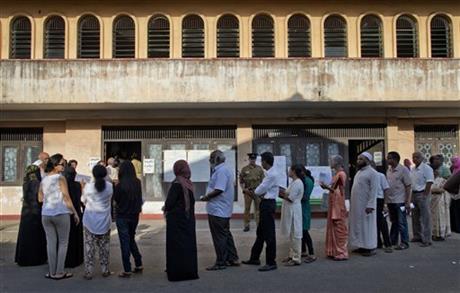
By BHARATHA MALLAWARACHI
Sri Lankans voted in parliamentary elections Monday that will decide the political future of a former strongman leader seeking a comeback eight months after being unseated in a shocking election loss.
Mahinda Rajapaksa, Sri Lanka’s leader for nine years until his Jan. 8 presidential election defeat to a former ally, was running for prime minister, a position that is second to that of president.
Since that election loss, there has been a reversal of fortunes for Rajapaksa, his family and friends, who were once all powerful controllers of the island nation. Some of them now face investigations or lawsuits for corruption, misuse of power and even murder.
Jagath Dissanayake, a 40-year-old businessman from the western city of Gampaha, said that he voted to continue what he called positive changes that the country has seen since Rajapaksa’s defeat.
He said he voted to build a “decent country that respects the rights of all the communities and safeguards the democratic rights of the people.” Dissanayake noted that Rajapaksa’s camp lost in the presidential election and said he should be defeated again and “sent home forever.’
Others, however, said the allegations against Rajapaksa were politically motivated.
“A lot of allegations were leveled at Mahinda Rajapaksa and his team, but so far no one has been sentenced and punished. For me it means they were politically motivated allegations,” said Lalantha Rasika, a 41-year-old businessman.
Rajapaksa was hailed a warrior king for defeating the Tamil Tiger separatists to end a nearly 26-year civil war. However, he is accused of using his popularity to take control of Parliament, the courts, the armed forces and all government institutions.
He was also accused of widespread human rights abuses and suppressing freedoms.
Rajapaksa was seeking an extended period of rule after abolishing a two-term limit for presidents when he lost in his attempt to win a third term.
His main rival in Monday’s election was the incumbent, Ranil Wickremesinghe, a two-time prime minister.
President Maithripala Sirisena, who was Rajapaksa’s health minister, is backing Wickremesinghe, with whom he formed an alliance in the January election after breaking away from Rajapaksa’s government.
Sirisena recently sent a letter to Rajapaksa, which he also released to the media, saying he would not appoint him prime minister even if he secures a majority in Parliament. Sirisena also accused Rajapaksa of promoting ethnic disharmony.
Polls closed late Monday afternoon, and the first results were expected after midnight (1830 GMT).
A majority for Rajapaksa would put Sirisena in an uneasy position, with loyalists likely to pressure him to name Rajapaksa prime minister. The prime minister acts for the president in his absence and replaces him if he is impeached, incapacitated or dies.
A majority for Wickremesinghe, meanwhile, would create a cohabitation government between the parties, led by Sirisena and Wickremesinghe, who have traditionally been bitter rivals.
Sri Lanka’s Parliament has 225 members, so any party or coalition must win at least 113 seats to form a government.
A local monitoring group, the Campaign for Free and Fair Elections, said that voter turnout was high and that election laws were being followed.
The group said some candidates who attempted indirect campaigning near polling stations were told to stop by the police.



